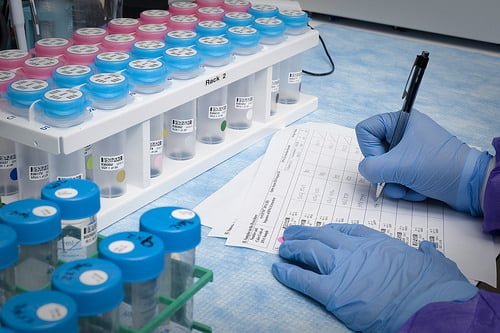Rush University Medical Center and the University of Chicago Institute for Translational Medicine (ITM) have awarded $100,000 to two collaborative research projects focusing on lung cancer and leukemia through the organizations’ 2016 Cancer Research Pilot Project.
The project provides seed funding to innovative translational cancer research teams from Rush University and the University of Chicago. The 2016 award recipients are:
Testing New Imaging Software to Improve the Accuracy of Diagnosing and Treating Lung Cancer
Rush University’s Mark Supanich, PhD, and UChicago ITM’s Samuel Armato, III, PhD, joined forces to evaluate the performance and accuracy of CT scanners in screening lung cancer, the results of which could lead to more accurate diagnosis and better treatment options.
Lung cancer is the leading cause of cancer death among men and women, according to the Centers for Disease Control and Prevention (CDC). CT scans of lung tumors play an important role in detecting, diagnosing and deciding a patient’s course of treatment. The more accurate a CT scan’s information is, the more accurate the diagnosis and resulting therapies are. And early detection is key to successfully treating patients.
In the past, tumor images have been used to estimate the diameter of a tumor, which is considered an efficient alternative to the most accurate assessment of a tumor’s impact: tumor volume. But now, new advanced imaging software may be able to determine tumor volume directly from images, a development that could enhance the accuracy of lung cancer screenings. However, the accuracy and reliability of this technology must be understood before it can be widely implemented to help patients.
Supanich and Armato will evaluate how effective this image software is over time. To do so, they will study how different CT scanners determine known lung tumor volumes to see if the scanners’ measurements are correct. They will also investigate how other factors, such as the equipment used, scanning protocol, and patient positioning, influence a scanner’s measurements.
This research will contribute to a more holistic understanding of CT scanners’ strengths, weaknesses and margins of error as they measure tumor volumes with this new software. Their findings will help accelerate implementation of the new software and lead to improved detection of lung cancer.
Research Title: “Image Quality Variability Assessment of Lung Cancer Screening CT Protocols and its Impact on Quantitative Lung Nodule Measurements”
To learn more about this research or explore opportunities for collaboration, contact Sam Armato at s-armato@uchicago.edu or Mark Supanich at mark_supanich@rush.edu.
Studying DNA’s Role in Blood Cancers to Find Better Diagnostic and Treatment Options
UChicago ITM’s Jason Cheng, MD, PhD, and Rush University’s Jamile Shammo, MD, will investigate the potential of using chromatin, or part of the complete DNA package, in diagnosing and treating blood cancers.
Myelodysplastic syndromes (MDS) represent a group of stem cell disorders where the bone marrow does not produce enough healthy blood cells, leading to anemia, low numbers of white blood cells, and the body’s inability to fight infections or stop bleeding. About 86 percent of MDS patients were age 60 or older at the time of their diagnosis, according to research in the American Journal of Medicine, and patients with MDS often require transfusions and have a higher risk of infection and bleeding.
MDS has the potential to progress to acute myeloid leukemia (AML). AML is the most common and fastest-growing type of bone marrow and blood cancer, causing rapid and uncontrolled growth of undeveloped or abnormal cells in the bone marrow that crowd out healthy blood cells. This makes the body incapable of making the normal cells necessary for fighting infections and stopping bleeding. Treatment can include chemotherapy, radiation, stem cell transplant or immunotherapy – but without treatment, AML is a lethal disease.
Cheng and Shammo are gaining a better understanding of the structural changes in these diseases’ chromatin to investigate whether it could help explain the cause of the cancer. They will study regulatory circuits, or clusters of genes that impact each other’s’ expressions, to identify the chromatin structures associated with MDS and AML. Once they pinpoint these structures, they will evaluate whether specific circuits do in fact control the production of leukemia cells in mice and dictate the cells’ response to drugs.
Their findings could provide insight on how to use chromatin information to more accurately diagnose and treat patients with MDS/AML.
Research Title: “A Novel Chromatin Structure-Based Approach to Epigenetic Reprogramming and Effective Therapy”
To learn more about this research or explore opportunities for collaboration, contact Jason Cheng at jason.cheng@uchospitals.edu and Jamile Shammo at jamile_shammo@rush.edu.
Learn more about future ITM funding and opportunities for collaborative research.
By: Kathleen Ferraro/UChicago ITM
This research is supported by the National Center For Advancing Translational Sciences of the National Institutes of Health under Award Number 4 UL1 TR 000430-10. The content is solely the responsibility of the authors and does not necessarily represent the official views of the National Institutes of Health.







